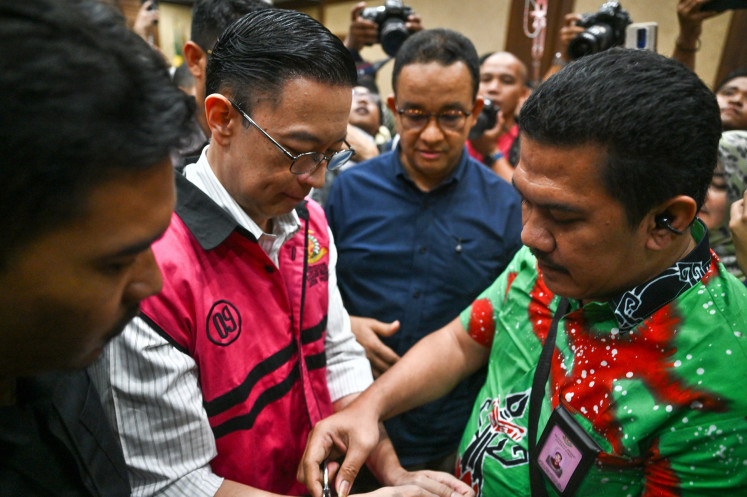Popular Reads
Top Results
Can't find what you're looking for?
View all search resultsPopular Reads
Top Results
Can't find what you're looking for?
View all search resultsPoor quality hinders projects
The government has acknowledged that its infrastructure-development program has unresolved problems despite the acceleration of construction projects in an effort to support economic growth
Change text size
Gift Premium Articles
to Anyone
T
he government has acknowledged that its infrastructure-development program has unresolved problems despite the acceleration of construction projects in an effort to support economic growth.
Infrastructure development is one of the key focuses of President Joko “Jokowi” Widodo’s administration, which has promised to achieve 7 percent economic growth by the end of its term in 2019.
However, the Public Works and Housing Ministry, which is the government’s main driver in implementing Jokowi’s infrastructure vision, has expressed concerns that the country’s stakeholders, including itself as regulator, have been unprepared for many construction projects.
The ministry is in charge of project supervision, yet at least five construction accidents occurred in the first half of this year, including at the Depok-Antasari toll road development in Jakarta.
“In 2015 to 2019, we’re seeing a boom in infrastructure [construction], but we have not been prepared properly for the infrastructure development,” said Syarif Burhanuddin, the ministry’s director general of construction, in a forum in Jakarta on Wednesday.
Syarif cited examples of the flaws, such as the high number of uncertified workers, low quality of construction materials and the poor monitoring of projects, all of which have contributed to a number of accidents.
Of a total of 8.13 million construction workers recorded in the Central Statistics Agency’s (BPS) data, the ministry noted that fewer than 7 percent, only 470,798 construction workers, were properly certified.
The ministry says that in its five-year working plan, it has set a target of having at least 950,000 workers certified by 2019, or 3 million workers as a more ambitious target.
“We started with around 180,000 [certified workers in 2014]. So, we need around 150,000 workers annually, but we can only manage to add 40,000 to 45,000 workers annually from the state budget,” he added.
Since 2017, the government has been trying to expedite the certification process through various schemes, including working with the private sector to help certify its workers using company funds.
Syarif, however, shrugged off concerns about the direct impact that might arise from the lack of certified workers on the quality of construction projects, pointing out that there were construction workers who already had 12 years’ experience without any certification.
He did add that numbers-wise, even the current 8.13 million construction workers might not suffice given the ever-growing number of infrastructure development projects. The ministry has calculated that each Rp 1 trillion (US$69.42 million) allocated for construction work will require 14,000 construction workers.
According to the government’s calculations, some Rp 4.7 quadrillion is required to build the planned infrastructure projects during the five-year term of Jokowi’s administration.
Jokowi’s vision includes building more than 1,800 kilometers of toll roads, 2,650 km of non-toll roads, as well as kick-starting the development of 49 new dams and finishing the ongoing development of 16 dams.
Erwin Aksa, deputy chairman of construction and infrastructure at the Indonesian Chamber of Commerce and Industry (Kadin), confirmed that there were major flaws in terms of human resources in the construction sector.
“The most common hassle that often occurs is that there are many new technologies we can use, but there are no workers with the skills to operate them. That’s what causes work accidents,” he said.
Syarif also noted Indonesia’s struggle with the lack of quality and indeed quantity of domestically produced construction materials, forcing projects to rely on imported goods, including cement and steel. He added that price stability was also unreliable.
Ministry data show that the local cement industry can only provide 68.1 million tons of the 69.3 million tons of cement required for construction projects this year. The domestic supply of steel, a major construction material, only amounts to 7 million tons, with 14.41 million tons needed this year.
Although there was a shortage of materials, Indonesian Iron and Steel Industry Association (IISIA) chairman Mas Wigrantoro Roes Setyadi said the local market was already dominated by imported products, while domestic production had not been fully utilized by the construction industry.
Moreover, in terms of business size, Syarif said 80 percent of the 139,852 construction companies in Indonesia were small players, limiting the country’s capacity to tackle large infrastructure projects.










